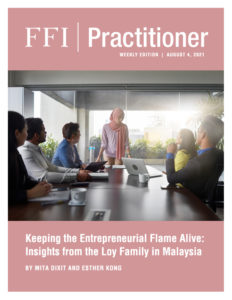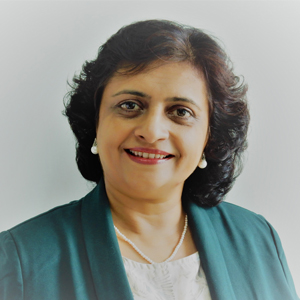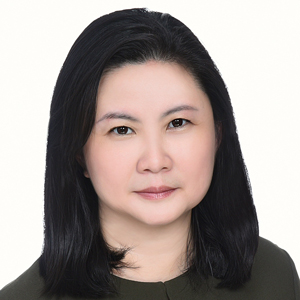
View this edition in our enhanced digital edition format with supporting visual insight and information.
Thank you to this week’s contributors from the FFI Asian Circle Virtual Study Group, Mita Dixit and Esther Kong. Their article discusses the Study Group’s approach to a case study of Dato’ Loy Teik Ngan’s family business and its transition to the third generation. The authors provide an overview of the family business’ history and explore the Study Group’s suggested approach of utilizing the “three Es”—Engage, Educate, and Encourage—to guide family business clients through generational transition.
The journey of generational transition for enterprising families is complex and challenging. The entrepreneurial resilience of these families helps their businesses embrace disruptions and manage transformational change. For advisors, guiding families in the process of generational transition can be a stimulating experience.
How can advisors help their clients sail through generational transition? We share a case study from our FFI Asian Circle Meeting in March 2021 on how Dato’ Loy Teik Ngan, Chairman of Taylor’s Education Group in Malaysia, and his family are trying to manage the family business transition from Generation 2 (G2) to Generation 3 (G3), despite multiple crises confronting the family.
The Tumultuous Times for the Family Business
Dato’ Loy’s life was smooth-sailing until it took a turn for the worse upon the demise of his father, Tan Sri Loy Hean Heong, founder of MBf Group, one of the largest conglomerates in Malaysia at that time.
As the eldest son, Dato’ Loy took over the reins of his family business in November 1997, as the Asian financial crisis was setting in. Within a year, the empire that took 35 years to build collapsed under the weight of substantial debts. Not only was the family fortune lost, but the family also found themselves in a desperate financial plight due to the personal guarantees that family members had given for loans taken out by the patriarch.
Dato’ Loy’s father was pioneering and ambitious. He created a billion-dollar enterprise by expanding his business into multiple industries. However, over-diversification and high leverage eventually became the Achilles’ heel of the business, leading to its downfall when the financial crisis struck.
Dato’ Loy and his brother were determined to clear the family’s debt and rebuild the business together. However, that dream vanished when his brother passed away following a fatal car accident a few years later. The Loy family continued to work hard to settle the family debts, an arduous journey that took 14 years. During this difficult time, Dato’ Loy started to build a new family business. He focused on education as the core business by investing in an education company and expanded its operations into the Taylor’s Education Group. Today, the Group is one of Malaysia’s largest and most reputable private education providers, operating in Malaysia as well as in Singapore and Vietnam.
The Phoenix that Rose from the Ashes
As the eldest son, Dato’ Loy shouldered the heavy responsibilities of fulfilling business obligations and managing the family’s emotions and demands, while keeping them together through the crisis. His younger siblings were still studying. His business acumen and resilience paid off and Dato’ Loy became a respected entrepreneur in his country.1
This challenging period in his life has shaped his views about life and the family business. He has acknowledged his ill-preparedness when he assumed the leadership of the family business. Having gone through a roller coaster ride, his family has since introduced initiatives and measures to prepare the rising generation of his family as stewards for the family and business. He recognized the importance of putting in place a system that engages the rising generation because successful succession planning is not an overnight event but a planned, long-term process.
For successors, an inevitable challenge is to manage the expectations of the incumbent generation while at the same time, aligning their personal aspirations with that of the family’s core values and vision. The Loy family consciously strives to develop a sense of both “us” and “me” at the same time, appreciating the needs of the individuals as just as important as the collective family’s. The rising-generation members are encouraged to pursue formal education in their chosen fields and have the freedom to choose their careers.
With the help of advisors, all branches of the family helped to develop a family constitution. The family constitution is reviewed periodically to ensure relevance and understanding of the stated vision and policies. This review also serves as a good education process for children as they come of age. The family now realizes that showing appreciation for what the family cherishes can be best served through the process of discussion and debate.
Dato’ Loy is married with four children and lives in a residential complex with his extended family of twenty members. Living in a shared compound can have its challenges. Rules of engagement and for living together harmoniously are designed, approved, and implemented by the Loy family’s “Living Together Committee.” This set of simple rules allows family members to live with independence and autonomy and at the same time enables everyone to cohabitate as a community.
Education plays an important role in the Loy Family, including non-formal education. For example, to teach family members the importance of shared responsibilities, all family members are given a voice in decisions where learning becomes an opportunity. Children are raised to learn that everyone has a voice and to accept that sometimes they do not get their way. Such an example is the family’s annual vacation, where everyone has a vote to select an organizing committee, and everyone including those as young as seven years old can stand for election in the committee. The family tries to foster an environment where everyone has a role to play, should they wish to, and where everyone can contribute to the family’s well-being.
The Loy family has also engaged advisors to develop communication systems and protocols. Family events, gatherings, and storytelling help in building familial relationships. Through the implementation of a YPO-like Forum for the next generation, they learn to communicate, address conflicts, and discuss differences in a healthy, mature, and respectful manner.
The Way Ahead: Enabling the rising generation to make their mark
Dato’ Loy is aware that his family business is at a critical juncture. The majority of the third generation (G3) has graduated from university. They now have the option either to join the family business or to embark on their own careers. Having experienced the highs and lows of family entrepreneurship, Dato’ Loy wishes to encourage G3 members to make their own mark, which may not be in the family business but in any field that they choose. In a recent meeting, our Asian Circle Study Group members discussed how Dato’ Loy can navigate through these challenges. From our cumulative insights as practitioners, we propose a “three Es” approach: Engage, Educate, Encourage.
1. Engage to build a living culture of governance
To help clients set up governance structures requires trust building. An advisor can understand family members’ aspirations and challenges thanks to open and engaged communication with them. Advisors can guide family members and particularly the rising generation to develop a living governance system in the following ways:
- Nurture trust and transparency by developing clarity on evolving roles and responsibilities of family members, and align entrepreneurial passion with family group objectives and goals via careful resource deployments.
- Establish communication systems and protocols for candid and authentic conversations across family members of various age groups, including discussion on working outside of the family business or setting up new business.
- Help build a family identity and a sense of pride and privilege in serving their family.
2. Educate to sustain growth, manage risks, and build entrepreneurism
For families to make informed decisions, sustain growth momentum, and develop an entrepreneurial spirit in the family, advisors can add tremendous value by sharing their expertise and experience in the following ways:
- Develop best practices for families on risk management, diversification, resource allocation, and decision making.
- Build family members’ capabilities of self-awareness, soft skills, and behavioural competencies. Create learning programs for the rising generation to become leaders, future owners, and responsible stewards.
- Provide resources formal or otherwise for the rising generation to develop their entrepreneurial projects or new ventures.
3. Encourage to work toward a common vision
The journey of generational transition is an evolving process. Families need to stay motivated and work toward a common vision. Advisors can play a significant role by providing advice to families at different stages of journey, including the following:
- Create a nurturing environment for the rising generation to participate actively in family meetings, make decisions, and develop an inspiring and encouraging family-business vision.
- Facilitate networking and peer learning platforms to build knowledge for both family- and business-related topics.
- Help the family identify and develop their talent pipeline (family or non-family) that best meets the needs of the current and future businesses.
Conclusion
Generational transition in any family business is a critical challenge. The risk of failure of family businesses by the transition to the third generation can be high. Processes and mechanisms must be developed for the family to stay united and for the business to stay robust and resilient.
We are grateful to Dato’ Loy for generously and candidly sharing his family’s experience, allowing the Asian Circle Study Group to hone our skills as advisors to business families. As challenges faced by the rising generation are multi-faceted, we hope to promote multi-disciplinary collaboration among advisors to support business families as they cross the chasm of intergenerational transfer. The Asian Circle’s live case discussion is another avenue to promote the exchange of expertise and experience among family business advisors.
Note
1The term Dato’ is an honorary title in Malaysia, conferred by a hereditary royal ruler of one of the nine Malay states of Malaysia.
About the Contributors

Mita Dixit, PhD, CFBA, is the Director and Family Business Advisor at Equations Advisors Private Limited, India and is a member of FFI Asian Circle Virtual Study Group. She can be reached at mitadixit@gmail.com.

Esther Kong, ACFBA, is the Senior Deputy Director of Business Families Institute at Singapore Management University and is Chair of FFI Asian Circle Virtual Study Group. She can be reached at estherkong@smu.edu.sg.

View this edition in our enhanced digital edition format with supporting visual insight and information.





